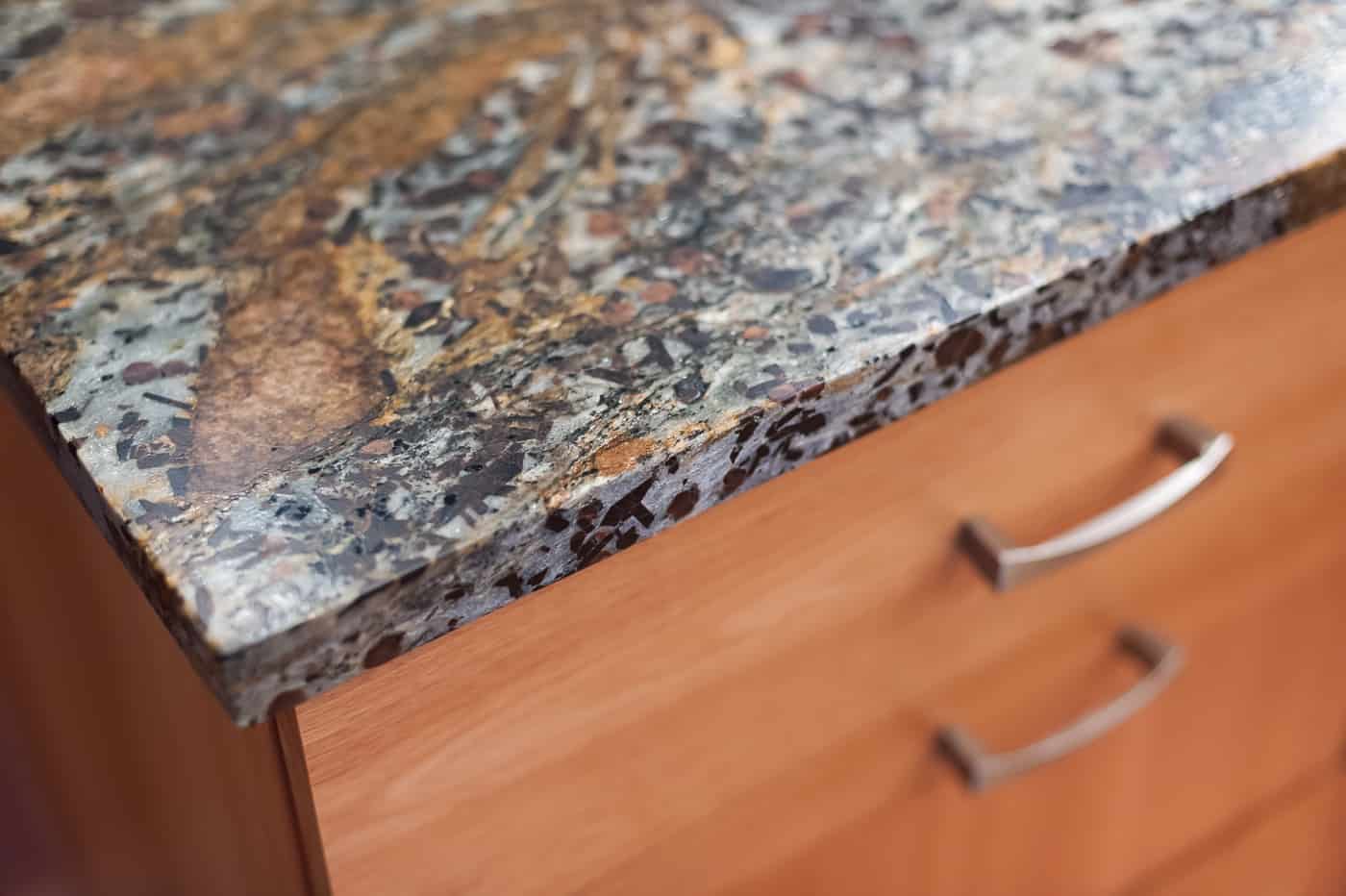
Kitchens
How To Select The Right Countertop For Your Kitchen
Countertops come in many varieties – granite and other natural stones, wood, glass, quartz, laminate, and more – so it can be challenging to narrow down your selection. Here is how to select the right countertop for your kitchen.
Design Consultant Karen Richmond says to ask yourself four main questions:
- What’s the style of your home?
- Do you want low-maintenance or are you willing to spend time on cleaning and care?
- Will you use the counter for other household activities?
- Do you want bold or neutral colors?
Answering these questions helps narrow your design elements and kitchen countertop options.
“Everyone tends to gather in the kitchen. And a show-stopping countertop can serve many functions including food-prep, serving station, workspace, cocktail bar and conversation starter,” Karen says.
Design considerations for all countertops
Kitchen Style
• What’s the overall look you’re trying to achieve?
• How will it complement the surrounding space and cabinetry?
• Do you want one countertop style, or a variety, to add visual interest?
• How will it fit and flow with the remaining areas of your house?
Functionality
• How will you use the countertop? (Meal prep, dining, entertaining, after-school homework, work-space, bar area, etc.)
Color
• Statement color or neutral?
• Combination of colors and patterns?
Cleaning and Care
• Low-maintenance vs periodic upkeep (sealing, etc.)?
• Durability?
Additional considerations
• Are you looking for a unique, one-of-a-kind countertop?
• Cost?
Kitchen Countertop Durability
When considering kitchen countertop options durability is also an important factor. The ability of countertops to withstand daily wear and tear from stains, scratches, heat, and impact significantly impacts their longevity. Several key factors that contribute to the durability of kitchen countertops include:
- Material Composition: Each countertop material has inherent properties that influence its ability to withstand daily use.
- Finish: The finish applied to the countertop surface plays a crucial role in its durability and resistance. The finish used can improve resistance against stains and scratches while also requiring more routine maintenance. Polished finishes for instance, common in materials like granite and marble, offer a glossy surface that resists stains but may show scratches more prominently. Honed or matte finishes provide a softer look and can be more forgiving of scratches, but may require more maintenance to prevent staining. Textured finishes, like leathered or brushed can also impact resistance levels, with some offering better protection from scratches.
- Supplier Quality: The quality of materials and craftsmanship provided by different suppliers can vary significantly. Reputable suppliers that source high-quality materials and stick to strict manufacturing standards create countertops that are more durable and resistant to damage. If lower-quality materials are used or shortcuts in the manufacturing process take place, the final product will be compromised and be more susceptible to stains, scratches, heat damage, and breaks from impact.
- Installation and Maintenance: Proper installation and regular maintenance are important for the durability of kitchen countertops. Poorly installed countertops may be more prone to damage, such as cracking or warping. Additionally, following manufacturer-recommended maintenance, such as sealing countertops, using cutting boards to prevent scratches, and wiping up oil splashes or spills, can help preserve the countertop’s resistance over time.
When planning your kitchen remodel and choosing materials it’s important to understand these factors, talk with your project manager, and choose high-quality materials from reputable suppliers to ensure durable and long-lasting kitchen countertops.
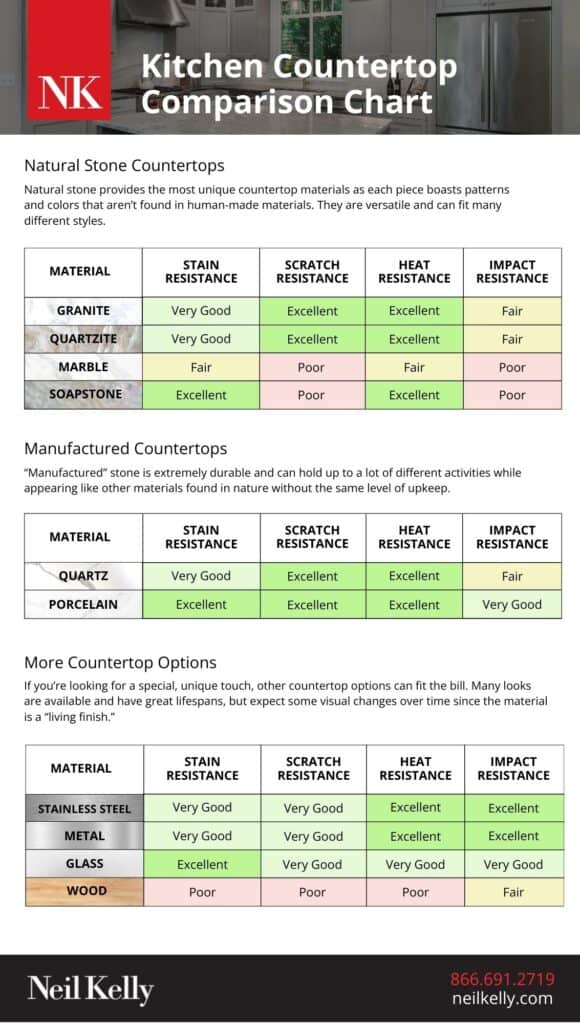 Download Our Gude: Kitchen Countertop Comparison Chart
Download Our Gude: Kitchen Countertop Comparison Chart
NATURAL STONE: GRANITE, QUARTZITE, MARBLE AND SOAPSTONE
Natural stone provides the most unique countertop materials as each piece boasts patterns and colors that aren’t found in human-made materials. Granite and other natural countertops are durable, but not indestructible, so care must be taken as they can chip, scratch, and stain.
Regularly sealing natural countertops helps preserve the surface, but you’ll still want to take special care as oils can stain and acids can etch the surface.
Though the names can be confusing, quartzite and quartz are different. Quartzite is “nature-made,” whereas quartz is created through a fusion of nature and technology.
Quartzite is quarried in many areas around the world resulting in very different looks. As Karen shares, “It’s a great choice for a marble look that is more stain resistant. It is often transparent, which can also be stunning when backlit.”
Marble and soapstone are prized for their “polished” look. Compared to granite, both marble and soapstone are relatively soft and are more commonly used in bathrooms.
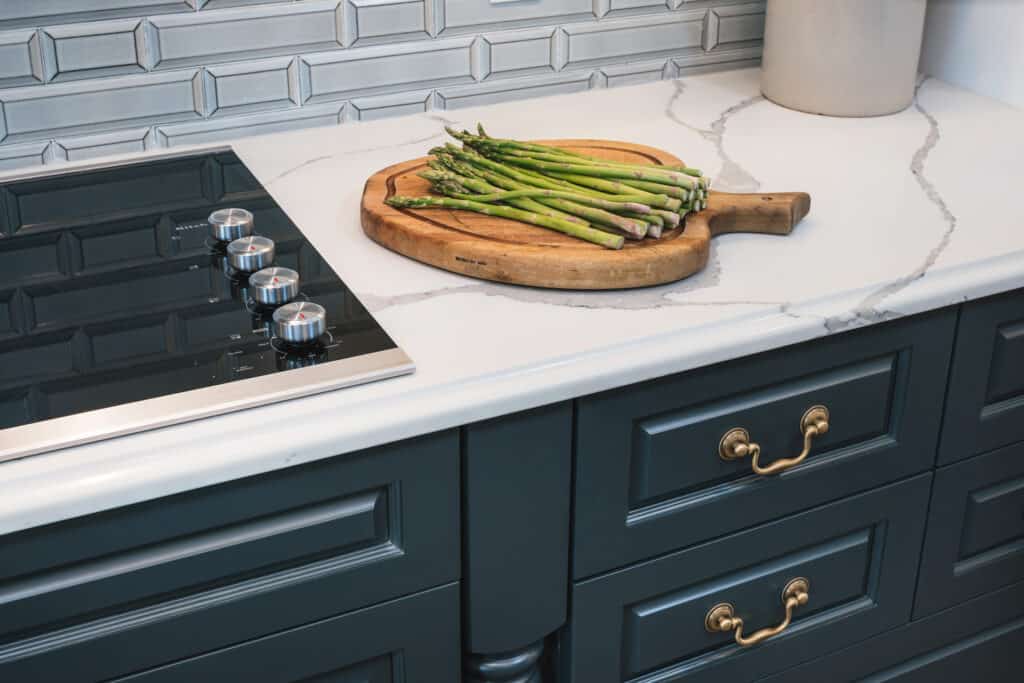
Above: Quartz Countertop
MANUFACTURED: QUARTZ AND PORCELAIN
Quartz, often referred to as “manufactured” stone, is a durable, low-maintenance material. Mixing ground quartz with polyester resins and compressing with high-pressure results in a nonporous slab that is stain and scratch-resistant. Unlike natural stone, it does not require sealing. Today, manufacturers can produce multi-colored tops with flecks, swirling, and random patterning to rival natural stone.
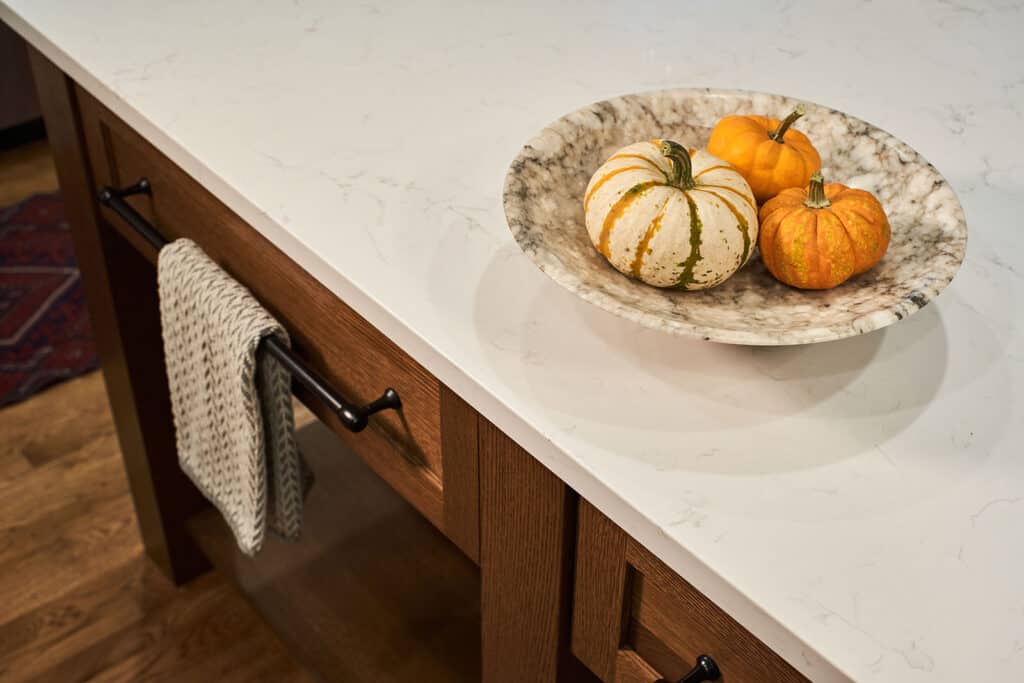
Above: Porcelain Countertop
Porcelain slabs or tile often resemble, marble, wood, or other materials found in nature– without the same level of upkeep. Countertops are heat and stain-resistant and the large format is a great option for oversize kitchen islands. They’re also suited for outdoor kitchens as they can withstand temperature fluctuations and are resistant to UV light. Porcelain does not need to be sealed. However, the raw material and fabrication costs will be higher than other choices.
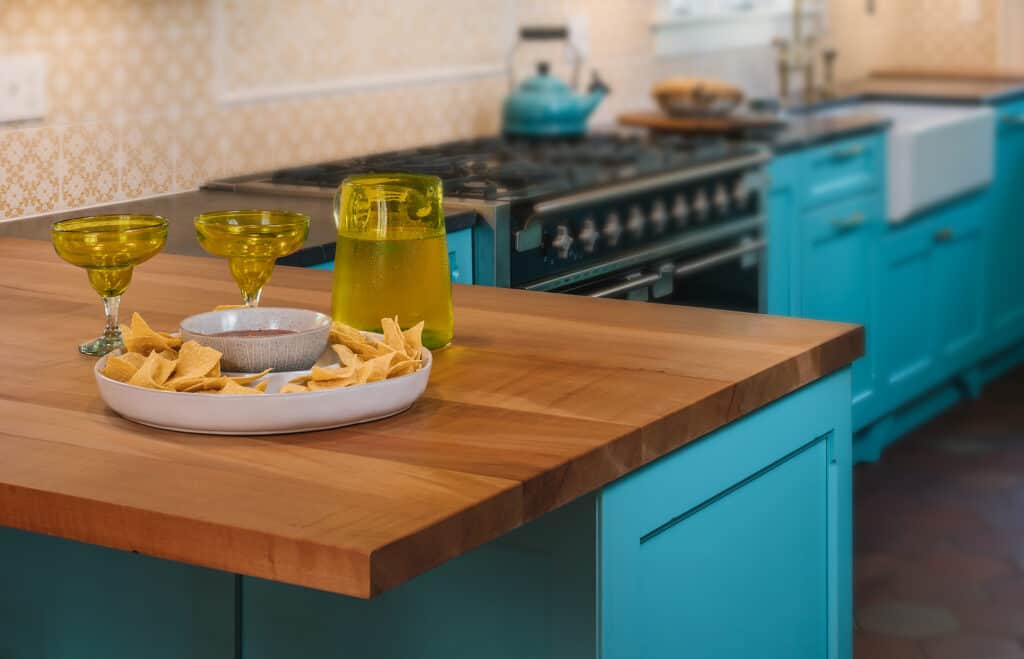
Above: Wood Butcher Block Countertop
MORE OPTIONS + ACCENTS: STAINLESS, METAL, GLASS, WOOD
If you’re looking for a special, unique touch, metal tops can fit the bill. Many looks are available ranging from copper to distressed finishes. Expect some etching and staining as the metal is a “living finish” and changes over time — like a shiny copper that patinas to a greenish cast.
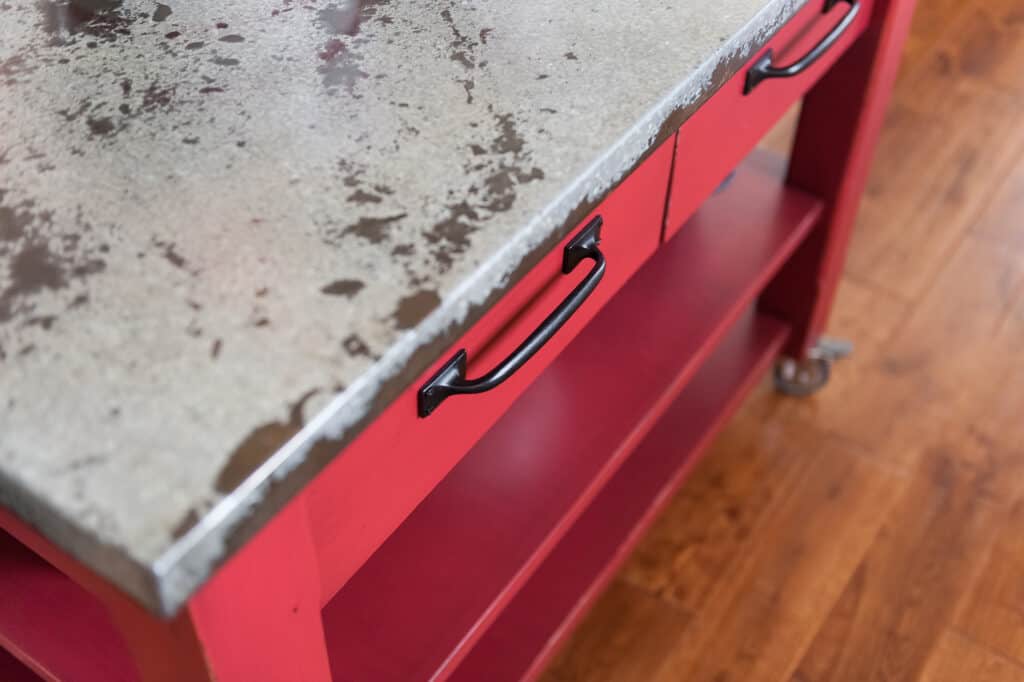
Above: Aluminum Countertop
Stainless steel countertops are another great choice for durability, hardness, stain, and heat resistance. Fair warning, however: stainless will scratch.
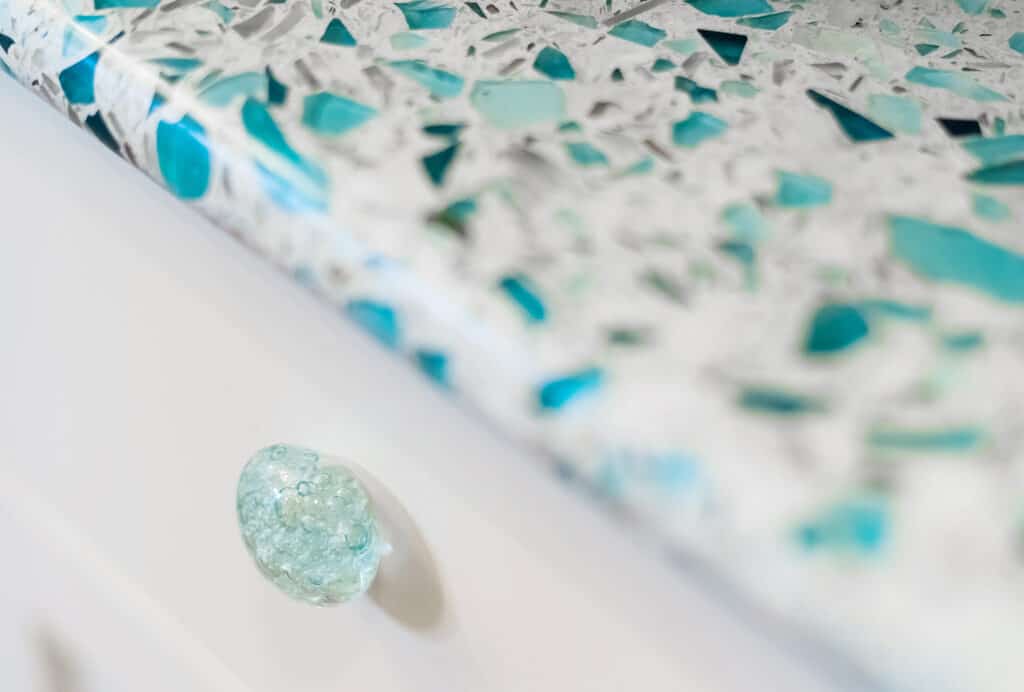
Above: Recycled Glass Countertop
Recycled glass countertops can be stunning. Not only do the glass chips vary in color, the concrete base the chips are set in can also be colored. No two counters are exactly alike.
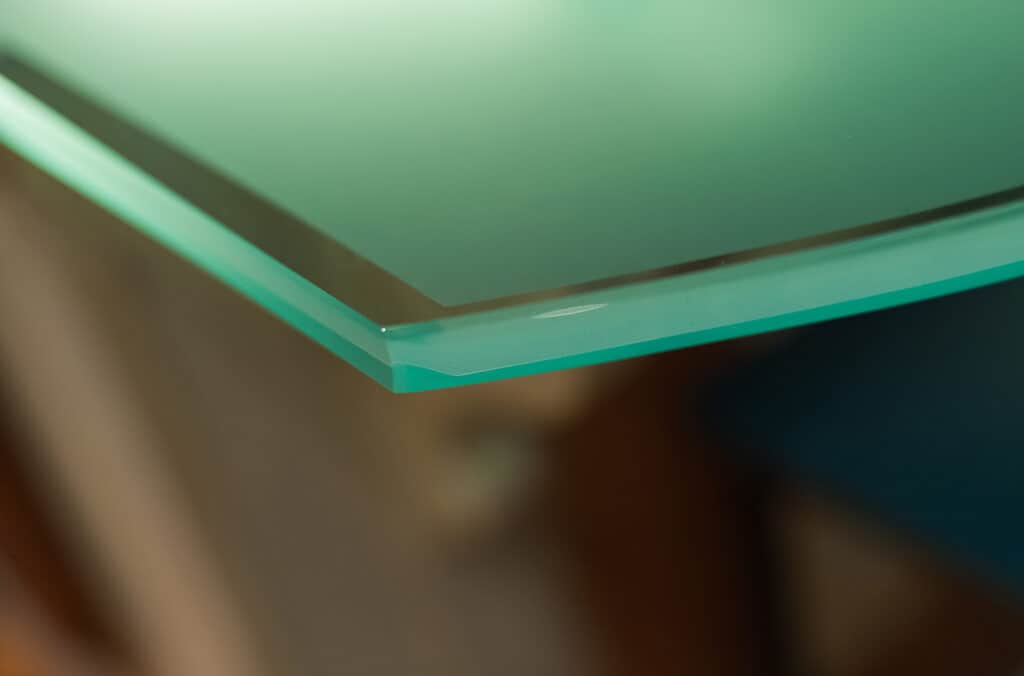
Above: Glass Accent Countertop
Glass countertops are mainly used for accent or decoration, not food prep. They are relatively durable and easy to maintain. Like natural stone, glass should be resealed. For an additional protective layer and sheen, apply a polish a couple of times a year.
Solid glass countertops vary in thickness; the thicker the glass the darker the color tint. Patterns can be added to glass with sandblasting or etching and slumped glass offers many textural possibilities. Clean with a regular glass cleaner.
Wood countertops provide a wonderful texture and color contrast. A butcher block counter can be a great workhorse if you are also open to the inevitable cut and patina surface that results. There are many sources of reclaimed wood–often with interesting stories—including storm-damaged trees, sinker logs, old beams, and barn wood. All make one-of-a-kind counters.
Practical, Yet Stylish
While countertops are mostly known for their utility, more materials are coming into the marketplace each year — some beautiful enough to become key elements in kitchen design! From gorgeous natural stone to durable synthetics, cabinets literally come in all styles, shapes, and sizes. Given the abundance of products to choose from and the technical demands of installation, we recommend working with a professional to select the countertop that will look best — and work best — in your home.
If you’re considering a kitchen remodel with lots of countertops, why not connect with a Neil Kelly designer? A complimentary design consultation is the perfect way to find out how you can have the stylish, functional cabinets you’ve always wanted.